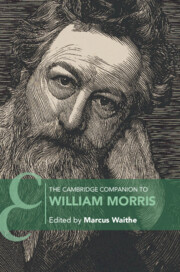Book contents
- The Cambridge Companion to William Morris
- The Cambridge Companion to William Morris
- Copyright page
- Dedication
- Contents
- Figures
- Notes on Contributors
- Acknowledgements
- Note on The Collected Works
- Chronology
- Abbreviations
- Introduction
- Part I Senses of Place
- Part II Authorship
- Chapter 5 Experimental Medievalism
- Chapter 6 Troubling the Heroic Ideal
- Chapter 7 Skaldic Morris
- Chapter 8 ‘The Whole Man’
- Chapter 9 Northern Epic
- Chapter 10 Utopian Fiction
- Chapter 11 Morris’s Prose Romances and the Origins of Fantasy
- Part III The Practical Arts
- Part IV Movements and Causes
- Part V Influences and Legacies
- Guide to Further Reading
- Index
- Cambridge Companions To …
Chapter 7 - Skaldic Morris
Translations from Old Norse
from Part II - Authorship
Published online by Cambridge University Press: 03 May 2024
- The Cambridge Companion to William Morris
- The Cambridge Companion to William Morris
- Copyright page
- Dedication
- Contents
- Figures
- Notes on Contributors
- Acknowledgements
- Note on The Collected Works
- Chronology
- Abbreviations
- Introduction
- Part I Senses of Place
- Part II Authorship
- Chapter 5 Experimental Medievalism
- Chapter 6 Troubling the Heroic Ideal
- Chapter 7 Skaldic Morris
- Chapter 8 ‘The Whole Man’
- Chapter 9 Northern Epic
- Chapter 10 Utopian Fiction
- Chapter 11 Morris’s Prose Romances and the Origins of Fantasy
- Part III The Practical Arts
- Part IV Movements and Causes
- Part V Influences and Legacies
- Guide to Further Reading
- Index
- Cambridge Companions To …
Summary
William Morris’s ‘greatest single inspiration’ was said to be the language and literature of medieval Iceland. After a brief survey of the origins and scope of Old Norse literary texts, this piece works through the considerable volume of translations of Old Norse saga literature which Morris made along with his Icelandic collaborator Eiríkur Magnússon, and considers why, after a ten-year period of astonishing productivity, his interest seems to have cooled. Morris’s knowledge of Old Norse literature and traditions is detailed, his translation methods are analysed, and the style and lexis of his controversially archaizing translations described, with special reference to Eiríkur’s experiences of working with him. Morris also translated Old Norse eddic verse, and many of the prose sagas he translated contain skaldic stanzas in the elaborate and unique dróttkvætt, or court, metre. The piece concludes with an assessment of these poetic translations, which are often overlooked, and the particular metrical and lexical challenges the originals present.
- Type
- Chapter
- Information
- The Cambridge Companion to William Morris , pp. 98 - 110Publisher: Cambridge University PressPrint publication year: 2024

